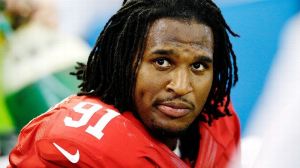The Bears just signed former 49er Ray McDonald to boost a depleted defensive line. That’s left some Chicago fans wondering, how do I cheer for a player with multiple recent run-ins with the law?
By Sarah Spain
On Tuesday, new Chicago Bears general manager Ryan Pace announced that the team had agreed on a one-year contract with free-agent defensive end Ray McDonald. McDonald was released by the San Francisco 49ers in December for what the team cited as “a pattern of poor decision-making.”
On Wednesday, Bears coach John Fox said the team will have strict standards for McDonald to meet.
Just days earlier I had watched with interest as Cowboys fans reacted to the signing of former Panthers defensive end Greg Hardy, who was initially convicted of assaulting and threatening to kill his ex-girlfriend (charges were ultimately dropped because, prosecutors alleged, Hardy had paid her).
Now, I’ve been put in the same position by my hometown Bears.
First, get familiar with the facts of McDonald’s checkered past. It has been nonstop legal trouble since 2010, including an arrest for alleged domestic violence in August 2014 (no charges were filed) and an ongoing investigation into an alleged sexual assault in December 2014. He hasn’t been charged in the most recent case, and earlier this month he announced plans to sue the accuser, telling ESPN’s Josina Anderson, “All I am trying to do is clear my name and move on with my life.” The NFL said Tuesday that the case is “under review” and could still result in league discipline.
With the switch to a 3-4 base scheme, the Bears are in desperate need of quality defensive ends. McDonald knows the scheme well; he started 14 games for the Niners last season under new Bears defensive coordinator Vic Fangio. The fact that McDonald meets a need and hasn’t been charged is enough for some fans to shrug off his run-ins with the law and embrace the signing.
It’s not so simple for me.
As much as I want to see my favorite team win, I simply can’t cheer for a McDonald tackle or sack without feeling sick to my stomach. Bears fans shouldn’t be put in a position to have to stop watching football because the league continues to prioritize talent over character. While I don’t expect to see that change anytime soon, there are certainly ways for the league to better handle its treatment of players like Hardy and McDonald.
I certainly understand the concept of “innocent until proven guilty.” I also know that the majority of domestic abuse cases never go to trial. McDonald has not been charged with a crime, but the fact that someone is not charged with assault is not proof of innocence — as the NFL has said repeatedly since revamping its conduct policy.
Think about it — without the surveillance tape, what would Ray Rice’s punishment have been? His then-fiancee, Janay Palmer, did not press charges after he punched her in the face last February, and she married him one day after he was indicted by a grand jury. If not for the video, the case likely would have been dropped due to a lack of evidence and a victim who refused to cooperate, just like countless other incidents that happen every day all over the country.
The National Domestic Violence Hotline reports that an average of 24 people per minute are victims of rape, physical violence or stalking by an intimate partner in the United States. That’s more than 12 million men and women every year.
While the NFL, the Bears and the fans are not in a position to amend the flaws of our legal system, we can apply common sense and be informed when dealing with situations like that of McDonald. After all, teams are not required to make personnel decisions based solely on the rulings of the court system. There may not be enough evidence to prove, beyond a reasonable doubt, that someone is guilty of assault, but there may be enough to decide that he’s not someone you want in your locker room or on the field representing your franchise.
If, after great care is taken to study the player and his history, the decision is made to sign him, that is a team’s legal right. The Bears have a right to sign McDonald, but Bears fans shouldn’t be expected to forgive and forget three criminal accusations in one year simply because a conviction didn’t occur.
And don’t forget this important fact: The best way to deal with players who have been accused and/or convicted of domestic violence isn’t always a “one and done” approach. When I spoke to experts for a rehabilitative justice piece in the past, they all agreed that a zero tolerance policy isn’t always the best approach. That can discourage victims from reporting crimes because they don’t want to affect their partner’s livelihood and may want to work on repairing their relationship. Kicking guilty domestic violence perpetrators to the curb is actually a mistake, they all said.
The goal isn’t merely to punish the crime, but also to prevent it from occurring again. There will be no change until the people in charge put the well-being of their players first, even if that’s for purely selfish reasons. If that player means that much to you on Sundays, then make sure he can stay out of trouble and stay on the field. If the league wants to allow for the possibility of second chances, they need to do so with their eyes open and their approach to the issue clearly and carefully explained to players and fans.
That’s a critical component for the NFL — talk to fans like intelligent, reasonable people. Teams need to speak openly about how they plan to rehabilitate a player who faces serious charges. They need to explain why they think a second chance is deserved and how they plan to provide them with an environment that will help prevent recidivism. It’s not just about pouring money into domestic violence PSAs or creating an advisory panel to discuss policy. If the NFL wants to get this right, a player who has faced accusations of domestic violence or assault should be required to agree to treatment in order to continue with his team or sign on with a new one.
Batterer’s intervention counseling and a peer-to-peer mentor relationship with a teammate or staff member would be a good place to start. If said player is one of the tiny percent of people who has been falsely accused, he’ll get valuable treatment and education he can spread to his teammates and family.
It’s a small price to pay for the privilege of playing in the NFL and making millions of dollars, and it’s certainly better than the alternative in place now — not treating the problem at all. If not for the Rice incident showing us, in black and white, just how ugly domestic violence truly is, we probably wouldn’t even be having conversations about Hardy and McDonald. Their incidents likely would’ve been swept under the rug, crudely categorized as “a private matter between two people” rather than a serious crime.
Fans deserve better. And you know what? So do the players and their loved ones. Turning a blind eye to the issue so your team can be better on Sundays won’t stop the cycle of violence. It’s not the NFL’s job to police these men. But if they’re going to put them in uniform and allow them to be a part of the most influential sports league in the country, they should care about what goes on when they’re not on the field. They should care about the message they send fans by lionizing and aggrandizing these men and they should care whether their willful ignorance is helping contribute to the pain and suffering of the people that these men go home to.
Like a lot of Bears fans, I likely won’t ever feel right cheering for McDonald. But if the Bears were to publicly broadcast that they expect more from him than just tackles and sacks, it would help. If they were to publicly detail a treatment program for him, pointing out the expectations and requirements he’ll have to meet in order to stay on the roster, fans might believe that a second chance in the NFL is about more than just wins and losses.


